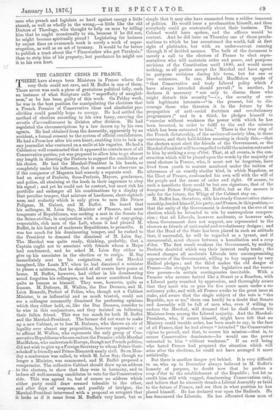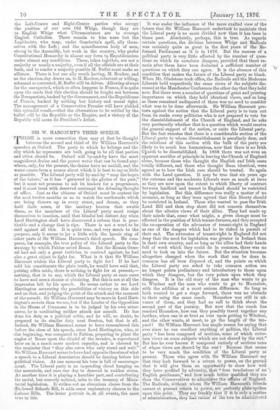THE CABINET CRISIS IN FRANCE. T ITERFI have always been Ministers
in France whom the very Gods could not save, and M. Buffet is one of them. There never was such a piece of gratuitous political folly, such an instance of what Scripture calls "superfluity of naughti- ness," as he has been guilty of this week. On Friday week, he was in the best position for manipulating the elections that a French Premier of Conservative ideas and absolutist pro- clivities could possibly hope to occupy. He had settled the method of election according to his own fancy, carrying the scrutin &arrondissement in division after division. He had regulated the circumscriptions by a law drawn up by his own agents. He had obtained from the Assembly, apparently by an accident, a formal consent to the system of official candidatures. He had a Press law after his own heart, enabling him to lock up any journalist who ventured on a smile at his vagaries. He had a Cabinet so well constructed-that it appeared to contain men of all Conservative parties, yet was prepared to allow him toll) almost any length in directing the Prefects to support the candidates of his choice. He had the Marshal-President in his hands, so completely under his influence, that it seemed to observers as if the conqueror of Magenta had scarcely a separate soul. He had an army of Prefects, Sons-Prefects, Mayors, gendarmes, and police, all straining at the leash in their eagerness to obey his signal ; and yet he could not be content, but must risk his portfolio and endanger all his combinations by a display of that peculiar temper, that mixture of harshness, short-sighted- ness, and audacity which is only given to men like Prince Polignae, K Guizot, and M. Buffet. He heard that his colleague, K Leon Say, Minister of Finance, and most temperate of Republicans, was seeking a seat in the Senate for the Seine-et-Oise, in conjunction with a couple of easy-going, respectable, rich men of the Left, whom it had pleased M. Buffet, in his hatred of moderate Republicans, to proscribe. It was too much for his domineering temper, and he rushed to the President to demand the dismissal of M. Leon Say. The Marshal was quite ready, thinking, probably, that a Captain ought not to associate with friends whom a Major had condemned, and he asked K Leon Say either to give up his associates in the election or to resign. M. Say immediately sent in his resignation, and the Marshal imagined, like Louis XV. when he had dismissed a minister to please a mistress, that he should at all events have peace at home. K Buffet, however, had either in his domineering mood forgotten his colleagues, or had never considered them quite as human as himself. They were, however, quite as human. it Dufaure, M. Wallon, the Due Decazes, and M. Leon Renault, Prefect of Police, who, though not a Cabinet Minister, is as influential and as much trusted, could not see a colleague summarily dismissed for professing opinions which they either hold, or, like the Due Decazes, consider to be wise in this conjuncture, and they insisted on following their fallen friend. This was too much for both M. Buffet and the Marshal-President. The former did not want to make up a new Cabinet, or to lose M. Dufanre, who throws an air of legality over almost any proposition, however repressive ; or to affront M. Wallop, who represents the only group of Con- servative Republicans who can endure the Premier; while Marshal MacMahon, who understands Europe, though not French politics, did not wish to give up a Foreign Secretary to whom Prince Gort- schakoff is friendly and Prince Bismarck nearly civil. So on Mon- day a conference was called, to which M. Leon Say, though no longer a Minister, was summoned, and M. Buffet proposed a compromise. The collective Cabinet should draw up an address to the electors, to show that they were in harmony, and to induce all well-meaning candidates to vote for the Conservative side. This was agreed to, but of course no address which either party could draw seemed tolerable to the other, and after days of suspense, and possibly of intrigue, the Marshal-President intervened with a proposal so arrogant that it looks as if it came from 3f. Buffet's very heart, but so simple that it may also have emanated from a soldier innocent of politics. He would issue a proclamation himself, and then everybody could go contentedly about their business. The Colonel would have spoken, and the officers would be content. And he did issue on Thursday one of those procla- mations to which he has accustomed the world, full at first sight of platitudes, but with an under-current running through it of decided menace. The bulk of the document is merely a call to the electors of France to elect repre- sentatives who will maintain order and peace, and postpone revisions of the Constitution until 1880, and would mean nothing, as all parties accept the Marshal and have agreed to postpone revisions during his term, but for one or two sentences. In one, Marshal Ma.cMahon speaks of "that Conservative and truly Liberal policy which I have always intended should prevail ;" in another, he declares it necessary "not only to disarm those who might disturb this security "—i.e. the security of cer- tain legitimate interests—" in the present, but to dis- courage those who threaten it in the future by the propagation of anti- social doctrines and revolutionary programmes ;" and in a third, he pledges himself to "exercise without weakness the power with which he has been invested, in order to fulfil to the end the mission which has been entrusted to him." There is the true ring of the French dictatorship, of the saviour-of-society idea, in those sentences, and their half-hidden meaning is clearly this,—that the electors must elect the friends of the Government, or the Marshal-President will be compelled to fulfil the mission entrusted to him by striking a coup critat. That, at all events, is the con- struction which will be placed upon the words by the majority of rural electors in France, who, it must not be forgotten, have lived from youth to mature manhood under the tuition of utterances of an exactly similar kind, in which Napoleon, as the Elect of France, confounded his own will with the will of the people and the cause of order and right. Of course, to such a manifesto there could be but one signature, that of the bourgeois Prince Polignac, M. Buffet, but as the menace is only for the future, the Whigs of the Cabinet stay on.
M. Buffet has, therefore, with his steady Conservative states- manship, landed himself, his party, and France, in this position,— that the unity of tlie Government is destroyed on the eve of an election which he intended to win by unscrupulous compres- sion; that all Liberals, however moderate, or however safe, whom Government does not support, are represented to the electors as friends of anti-social and revolutionary designs ; and that the Head of the State has been placed in such an attitude that, if successful, he will be regarded as a tyrant, and if unsuccessful, must choose between a humiliation and a coup d'etat. • The first result weakens the Government, by making Prefects doubtful which way their interest really tends ; the second changes all moderate Liberals into uncompromising opponents of the Government, willing to buy support by very Radical pledges ; and the third makes the old danger of France—the struggle between the legislative and the execu- tive powers—in certain contingencies inevitable. With a Premier who arouses hatred like a Stuart or a Bourbon, with a Liberal party reunited by oppression, and thoroughly aware that they must win or pass for five years more under a re- actionary yoke, and with all France awake to the great issue at stake, and aware that the single subject of the vote is "the Republic, aye or no," there can hardly be a doubt that Senate and Assembly will be full of men who, even if willing to endure the Marshal, will demand that he shall choose his Ministers from among the Liberal majority. And the Marshal- President, who, if secure himself, might have felt that no Ministry could trouble order, has been made to say, in the face of all France, that he had always " intended " the Conservative re'girne to prevail, and that, to secure his mission—that is, to secure Conservative dominance—he would use the power entrusted to him "without weakness." If an evil being who hated France had prepared the situation which will arise after the elections, he could not have arranged it more artistically.
But there is another danger yet behind. It is very difficult to us, who up to December always believed in M. Buffet's honesty of purpose, to doubt now that he prefers a coup cre'tat to the establishment of the Republic ; but let us credit him still with rugged, domineering Conservatism only, and believe that he sincerely dreads a Liberal Assembly as fatal to the future of France, and see then in what position he has placed himself. He has declared war upon the Radicals. He has denounced the Liberals. He has affronted those men of the Left-Centre and Right-Centre parties who occupy the position of our own Old Whigs, though they are - to English Whigs what Ultramontanes are to average -English Catholics. There remain to him none but the .Legitimists, who may, under Gambetta's spell, ally them- selves with the Left ; and the miscellaneous body of men, strong in the Assembly, but weak in the country, who prefer Constitutional Monarchy in almost any form to Republicanism under almost any conditions. These, taken together, are not a majority or nearly a majority, even if all the officials are at their back, and to render a majority possible M. Buffet must make an alliance. There is but one ally worth having, M. Rouher, and as the election-day draws on, to M. Rouher, reluctant or willing, ashamed or contented, M. Buffet will be driven. Allowing always for the unexpected, which so often happens in France, it is quite upon the cards that this election should be fought out between the Bonapartists, backed by the Government, and the Republicans of France, backed by nothing but history and moral right. The management of a Conservative Premier will have yielded this splendid result,—that the alternatives to be settled by the ballot will be the Republic or the Empire, and a victory of the Republic will mean its President's defeat.



































 Previous page
Previous page